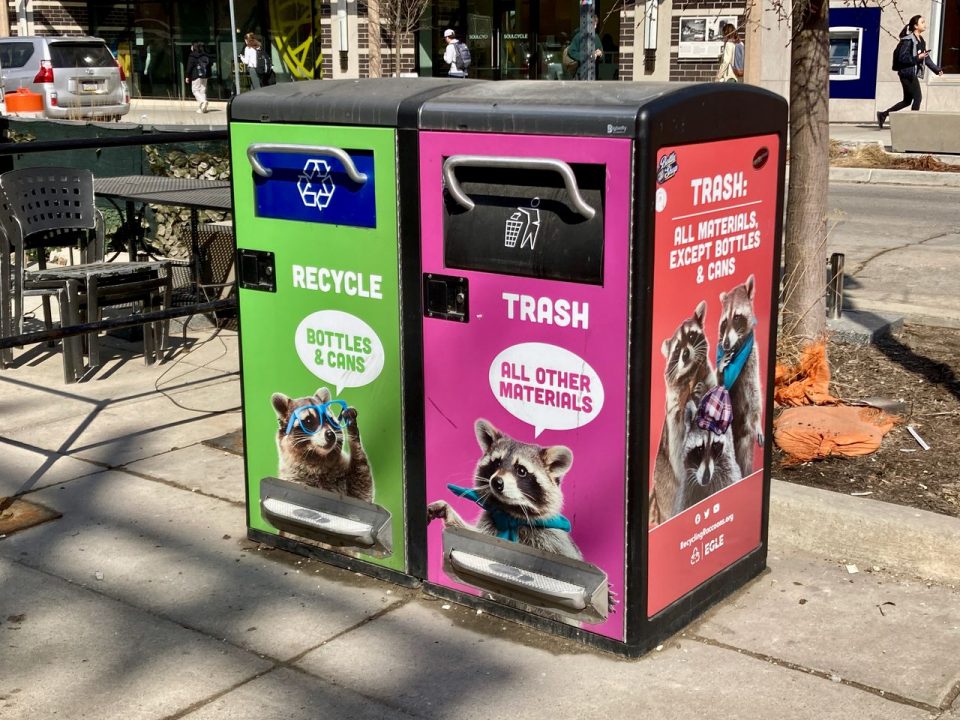LANSING, MI — Michiganders increased the amount of waste sent to recycling centers instead of landfills before the onset of the pandemic, according to state regulators.
The state reached a 19.3 percent recycling rate in 2019, according to a one-page analysis from the Michigan Department of Environment, Great Lakes and Energy (EGLE).
The increase was announced Monday, April 18 alongside an effort to boost recycling around Michigan through $7 million in grant funding to businesses and local governments.
The announcements were made to coincide with Earth Week.
Michigan, which has cheap and plentiful landfills, has struggled for years to increase the amount of solid waste that’s recycled, with a rate that’s been the lowest among Great Lakes states and well below the national average of about 34 percent.
The state attributed the increase, up from 14.3 percent in 2014, to improvements in the recycled materials supply chain, increased consumer access and greater volumes of overall waste being disposed of. EGLE adjusted that number downward from 15 percent after an analysis.
“It’s still low — 19.3 — but ultimately, we’re seeing it go in the right direction,” said Matt Flechter, a recycling market development specialist at EGLE.
In 2018, Michiganders recycled 1.9 million tons of material, EGLE says. That’s an increase of more than 500,000 tons compared to 2013 and correlates to each household recycling more than 1,000 pounds of waste each year.
The state collects annual data on waste collection and recycling but does not analyze the numbers on an annual basis due to difficulties collecting standardized data from recovery facilities and waste-haulers, EGLE says.
The pre-2019 Michigan recycling rate increase does not account for changes in consumer waste disposal since the onset of the COVID-19 pandemic.
Kerrin O’Brien, director of the Michigan Recycling Coalition, said she suspects the recycling rate has “probably increased, but not very significantly” since the pandemic began.
O’Brien said changes in consumer habits, such as buying more goods online which must be shipped in cardboard boxes, affected waste and recycling collection during the pandemic.
Waste haulers also had to adjust to larger collection from residential bins versus commercial Dumpsters as people began staying home and working from home, she said.
Flechter said the pre-COVID increase in the state’s recycling rate also traces with an overall increase in waste disposal at large during that time period in Michigan.
“We’re seeing an upward tick in the amount of that people are recycling, but we’re also seeing and upward tick in the amount that people are disposing, which is frustrating,” Flechter said. “People are doing a better job recycling correctly, but they’re also throwing away more trash.”
O’Brien, who was not part of the state’s announcement Monday, said Michigan’s solid waste management laws need to be updated through legislation pending before the state Senate before the state could significantly increase its recycling rate.
Gov. Gretchen Whitmer and the state Legislature have indicated they want to raise Michigan’s recycling rate to 30 percent by 2025 and 45 percent by 2030.
A package of bills passed by the state House in spring 2021 would overhaul solid waste laws to incentivize composting and recycling. The legislation is supported by both business and environmental groups in Michigan.
“It’s good news that investments are being made and we are making progress, but that progress could be leveraged in a much more significant way with planning and a real interest by local governments to provide services that are necessary to meet the significant state goals we have,” O’Brien said.
The legislation would help local governments “focus on how they can bring recycling opportunities to their communities in a more robust way so we can move that rate,” she said.
EGLE says it has made efforts to improve the recycling rate since 2019, notably through the $1.6 million “Know It Before You Throw It” marketing campaign, which features cheeky raccoons that offer tips on what can and can’t be recycled.
The EGLE “Recycling Raccoon Squad” was developed by Gud Marketing of Lansing, which the state recently awarded a $3 million contract extension in October.
The raccoon campaign began in 2019 to promote recycling education in order to decrease the amount of non-recyclable materials tossed into bins and drop-off sites.
Also in 2019, the state Legislature approved the Renew Michigan Fund, from which EGLE said it’s allocating $7 million in grants to improve recycling access this year.
Funded projects announced Monday include $300,000 to support an ACI Plastics project to process plastic film in Flint; a $202,000 grant to put curbside recycling carts in Detroit parks; a $135,000 grant to expand commercial recycling in Oakland, Macomb and Wayne counties; a $251,000 grant to bring curbside recycling carts to homes in Marquette; a $1 million grant for construction of a recycling center near Alpena; and a $275,000 grant to help a Grand Rapids company, Wormies, move and expand its composting business.
The money follows $4.7 million in similar grants last year.
“This level of commitment and partnership to comprehensively promote recycling between Michigan’s private sector and state government has never happened in our state’s history,” said Liz Brown, materials management director at EGLE, during a Monday announcement.
“And we believe that it marks the greatest accomplishment in recycling since our state achieved its first-in-the-nation status by introducing the bottle deposit law back in 1976,” she said.
Related stories:
Chemical industry pitches ‘advanced recycling’
E-waste recycling up in Michigan rural areas
MLive documentary: Michigan’s Bottle Bill
Talking raccoons to teach recycling in Bay City
How to recycle unwanted electronics in Kalamazoo


